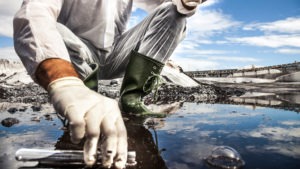Camp Lejeune – All You Need to Know
Thousands of people have come forward claiming that contaminated water at Camp Lejeune caused a whole host of illnesses. Following recent legislation passed by Congress, people alleging illnesses have now been afforded a right to sue the government for illnesses contracted from Camp Lejeune’s contaminated water.
What happened at Camp Lejeune, what are the new developments in the litigation, and are you entitled to compensation? Learn everything you need to know about Camp Lejeune and whether you need to find a good personal injury attorney.
What Is Camp Lejeune?
Built in 1941, Camp Lejeune is a Marine Corps base located in North Carolina. It is located on the coastline of Jacksonville and is still in operation today. Millions of people, including Marines, their family members, and other civilian staff have lived at Camp Lejeune since its inception.
For a free legal consultation, call (725) 900-9000
Water Contamination at Camp Lejeune
Millions of people stationed at Camp Lejeune were unknowingly exposed to toxic substances in the base’s water for over thirty years. It was determined that water from the Tarawa Terrace water treatment plant was contaminated—among other things—with:
- Trichloroethylene (TCE): An on-base solvent used to clean metal machinery
- Tetrachloroethylene (PCE): Chemicals used in dry cleaning and metal degreasing
- Benzene: Used to make other chemicals that compose nylon, synthetic fibers, and plastics
- Vinyl chloride (VC): TCE and PCE in underground water eventually degrade into VC
TCE was the primary toxic substance found in water from Hadnot Point water treatment plant. These chemicals are called Volatile Organic Compounds (VOCs) and are known cancer-causing carcinogens.
The Agency for Toxic Substances and Disease Registry (ATSDR) found that one source of the contamination stemmed from waste-disposal practices from off-base dry cleaners. Other sources of contamination resulted from leaking underground tanks, industrial spills, and waste disposal sites.
North Carolina Statute of Repose
Despite closing most of the water wells between 1982 – 1985, victims have been previously precluded from suing the United States government to seek damages for their injuries. Consequently, many of those exposed have never received just compensation. Many of those who undoubtedly contracted an illness from the water at Camp Lejeune have tragically died or are already plagued with illness.
The North Carolina Statute of Repose (NCGS § 1-52(16)) is primarily responsible for why so many claims have been dismissed. Without getting to the merits of the case, the statute prevents damages claims against more than ten years after its last act of pollution. Consequently, NCGS § 1-52(16) provides immunity to the military from any damage claims by Camp Lejeune victims.
Click to contact our personal injury lawyers today
New Legislative Acts
Only recently have victims started to receive recognition for illnesses they contracted from toxic water at Camp Lejeune. While President Obama signed legislation providing $2 billion in medical care and benefits, this allocation of funds has not provided the full relief needed. Congress has since sought to remedy the harm by passing a string of legislation aimed at assisting victims.
Camp Lejeune Justice Act of 2022
In August 2022, Congress passed the Camp Lejeune Justice Act (CLJA) as part of the Honoring Our Promise to Address Comprehensive Toxics (PACT) Act. This new legislation now provides the victims with a right to sue the United States government and seek damages for injuries they incurred. The Act also allows victims to receive disability and other benefits, including medical treatment and cancer care.
Honoring Our Promise to Address Comprehensive Toxics Act of 2022
In June 2022, the PACT Act was amended to include the full version of the CLJA. The bill provides approximately $6.7 billion in funding for exposure victims. The PACT Act will also provide Camp Lejeune victims a host of other benefits if certain criteria are met, including future medical monitoring.
Complete a Free Case Evaluation form now
How to File a Claim
To qualify for a settlement, you must have been present at Camp Lejeune for at least thirty days between August 1, 1953 and December 31, 1987. The amount of money you will receive will depend on the diagnosis received and the severity of the illness in question.
If you or someone you know faced exposure to contaminated water at Camp Lejeune, then speak to a lawyer. Van Law Firm has knowledgeable lawyers who can guide you on your options and inform you on whether you may be entitled to financial compensation.
No obligation consultations are always free.
Let Us Help You! Call Now: (725) 900-9000

